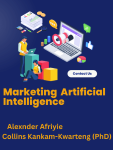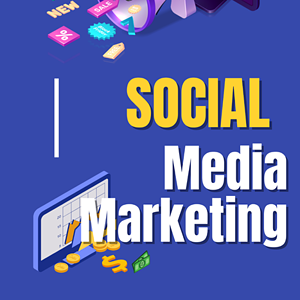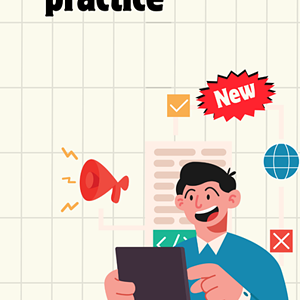By:
Alexnder Afriyie
Collins Kankam-Kwarteng (PhD)
Introduction
Welcome to our book on Marketing Artificial Intelligence! In today’s competitive business landscape, it is essential for companies to stay ahead of the curve and utilize the latest technologies to attract and retain customers. AI has quickly become a game-changer in the world of marketing, offering unparalleled insights and capabilities that can greatly enhance a company’s strategic approach.
Throughout this book, we will cover key concepts and strategies related to using AI in marketing, starting with an introduction to what AI is and how it applies to the field of marketing. We will then dive into various applications of AI in different areas of marketing such as customer segmentation, personalized advertising, predictive analytics, and more.
Our highly experienced instructors will guide you through case studies and practical examples to help you understand how AI can be effectively integrated into your marketing efforts. You will also engage in hands-on activities and exercises that will allow you to apply your learnings in real-world scenarios.
By the end of this book, you will have a comprehensive understanding of how AI can revolutionize your marketing strategies and drive tangible results for your business.
By the end of this book, participants will have a thorough understanding of Marketing Artificial Intelligence, its benefits, applications, implementation techniques, and ethical considerations. They will also have the skills and knowledge to effectively use AI in market analysis, planning, and campaign execution to drive better results for their organizations. Readers will be able to collaborate with team members and make informed decisions about when to integrate AI into their overall marketing strategy. So, get ready to elevate your knowledge and skills in this exciting field. Let’s dive into Marketing Artificial Intelligence together!
Learning Objectives
1: Understand the concept of Marketing Artificial Intelligence
2: Learn how to effectively use AI in market analysis and planning
3: Develop skills in implementing AI-based marketing campaigns
4: Master techniques for measuring ROI on AI-based marketing efforts
5: Understand ethical considerations when using AI in marketing
6: Collaborate with team members on integrating AI into overall marketing strategy
Table of Contents
Module 1: Introduction to Marketing Artificial Intelligence
– Defining artificial intelligence (AI) and its role in marketing
– History of AI in marketing and its evolution
– Explain the fundamentals of Marketing Artificial Intelligence (AI)
– Discuss current trends and applications of AI in marketing
– Advantages and benefits of using AI in marketing strategies
– Common misconceptions about AI in business
– Ethics and ethical considerations when using AI in marketing
Module 2: Understanding the Basics of Artificial Intelligence
– Different types of AI and their applications in marketing
– Explore various tools and techniques for analyzing market data using AI
– Apply predictive models to forecast consumer behavior and make better strategic decisions
– Understand how AI can help streamline and optimize marketing plans for maximum results
– Machine learning, natural language processing, computer vision, and other key terms explained
– How AI algorithms work and make decisions
– Data collection, cleaning, and management for effective AI implementation
Module 3: Leveraging AI for Market Research
– How AI can enhance market research methods like surveys, focus groups, and consumer behavior analysis
– Using sentiment analysis to understand customer opinions and emotions towards products or brands
– Predictive analytics for forecasting market trends and consumer behavior
– Learn how to design, implement, and monitor AI-powered marketing campaigns
– Understand the differences between traditional marketing strategies vs. those driven by AI
– Gain hands-on experience using AI tools to target specific audiences, personalize content, and improve customer engagement
Module 4: Personalization with AI
– The power of personalized content and messaging in marketing campaigns
– How AI can help segment audiences accurately based on data insights
– Examples of successful personalized marketing campaigns utilizing AI technology
– Discuss key performance indicators (KPIs) for evaluating the success of an AI-driven campaign
– Analyze data from past and ongoing campaigns to assess effectiveness
– Incorporate feedback loops to continuously improve future campaigns
Module 5: Optimizing Digital Advertising with Artificial Intelligence
– Automated ad targeting through audience profiling with the help of AI tools
-A/B testing for ads using machine learning algorithms to determine optimal performance
-Creating effective ad copy with natural language generation
Module 6: Enhancing Customer Experience through Chatbots
-The role of chatbots in providing instant personalized customer service
-Best practices for developing chatbot scripts that reflect brand voice
-Monitoring chatbot performance through data analysis
Module 7: Utilizing Artificial Intelligence in Content Creation
-Creating engaging content using natural language generation tools
-Social media post scheduling utilizing machine learning algorithms to determine optimal timing
-Automating content distribution based on user preferences with the help of predictive analytics
Module 8: Measuring and Analyzing Marketing AI Results
-Using key performance indicators (KPIs) to measure the success of AI in marketing strategies
-Analyzing data and adjusting for continuous improvement
– Develop effective communication strategies for discussing the implementation of AI with stakeholders
– Work together as a team to brainstorm new ways of utilizing artificial intelligence in different aspects of marketing
– Create an action plan for incorporating AI into existing or upcoming campaigns.
-Case studies and real-world examples of successful AI-driven marketing campaigns
Module 9: Overcoming Challenges and Risks in Marketing AI Implementation
-Common challenges businesses face when integrating AI into their marketing strategies
-Best practices for mitigating risks associated with using AI in marketing
-Ethics, privacy, and security concerns to consider when using AI in customer data analysis
– Explore potential ethical concerns related to using AI in marketing
– Discuss best practices for maintaining transparency, accountability, and fairness in AI-driven campaigns
-Make informed decisions about when it is appropriate to use or not use AI in a particular marketing context.
Module 10: The Future of Marketing Artificial Intelligence
-Latest trends and advancements in the field of marketing AI technology
-Impact of AI on the future of digital marketing
-Predictions for how AI will continue to shape the industry
-Final project where they will apply the concepts learned throughout the course to develop a strategic marketing plan incorporating artificial intelligence.
Module 11: Exams




Reviews
There are no reviews yet.